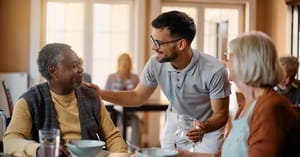What to Eat and Why
Harvard's Food Literacy Project attempts to answer the big questions about food and dining for students.
Michael Buzalka

Harvard’s Executive Director of Housing & Dining Services Ted Mayer (r.) and Food Literacy Project Coordinator Dara Olmsted (l.) meet with students at an FLP event.
Terms like “authentic,” “sustainable,” “organic,” “vegan,” “humane,” and “free range” are hot topic buzzwords in today's foodservice environment, especially in colleges. The challenge for operators is that these buzzwords often mean different things to different people, leading to expectations that may not be met with any consistency or cost-effectiveness.
Several years ago, Harvard University Hospitality & Dining Services (HUHDS) decided to meet the challenge in a direct and proactive way with what it calls its Food Literacy Project (FLP). The brainchild of HUHDS Assistant Vice President Ted Mayer, the FLP seeks to promote enduring knowledge about food and dining that enables students to make informed meal choices. It focuses on four areas: food preparation, agriculture/sustainability, nutrition and community.

“Instead of doing one-offs whenever students confronted us about some aspect of the dining program, we decided to develop a more comprehensive program,” says Mayer.
“It came out of the major trends we were dealing with,” he adds “There was the growing interest in food — students watch the Food Network more than just about anything else — plus the increase in students with food allergies and the strong interest among college students generally about issues of sustainability.”
In addition, he notes, Harvard students often go on to careers — in politics, in industry and in international relations — where knowledge of food and its relationship to culture is valuable in and of itself. From a purely practical perspective.
At a Glance
Name:Harvard University Hospitality & Dining ServicesResidential Dining:13 undergraduate dining halls plus Hillel Kosher KitchenRetail Dining:12 locationsCampus population served:6,650 undergraduate students, 12,500 graduate students, 11,900 full-time equivalentsMeals per year:5 million, or 26,000/dayNo. of employees:720Total revenue (FY 10):$53.7 million
FLP programs allow Harvard students, if they choose to participate in enough of the various activities, to get a fairly good education about food, dining and its relationship with society — for free. The programs are all open to first-come-first-served sign-ups.
Mayer notes that in developing the FLP, HUHDS had impressive resources to tap — alumni who had made successful careers in food and hospitality, plus Harvard's School of Public Health, one of the country's leading research and policy resources in the areas of nutrition and wellness.
A Comprehensive Effort
Since its inception in the fall of 2004, the FLP has gained an impressive foothold in Harvard's campus culture, with broad-appeal events such as presentations by prominent figures like Carlo Petrini, founder of the international “Slow Food” movement, and authors like Jeff Potter (Cooking for Geeks) and Amanda Hesser (The Essential New York Times Cookbook).
The FLP also sponsors tours of area farms and notable processing facilities, puts on workshops and educational sessions focused on food, dining, culture and culinary traditions; works with local social service organizations to promote community involvement in local food production and culinary education; and it highlights Harvard's own contributions to the national discussion on food and nutrition.
Food Literacy Project Events
Here are some recent events sponsored and developed by the Food Literacy Project at Harvard Recent house-specific eventsCooking classes in the Masters’ residences Freshmen: February 3, Healthy Vegetarian Quincy: February 8, Mediterranean Mather: February 10, Hors d’oeuvres Currier: February 17, Tapas Freshmen: March 8, Tapas Changing the Way We Eat Viewing Party: February
12 (TEDX Manhattan’s webcast highlighting the sustainable food movement) Recent campus-wide eventsSeptember 2010Through the Gates Tour: Culinary CambridgeOctober 2010Community Cooking Classes: Vegetarian Spotlight, with Mollie Katzen
City Sprouts Garden Volunteer Day
Harvard Garden Harvest Fest
Exploring Careers in Food and Wine
Divinity School Garden Harvest Party
Carlo Petrini Lecture
Cranberry Bog TourNovember 2010Author talk: Amanda Hesser: The Essential New York Times Cookbook
Thanksgiving Cooking ClassesDecember 2010Author talk: Jeff Potter: Cooking for GeeksJanuary 2011J-Term cooking classes

FOOD LITERACY AL FRESCO. Farmers markets and chef demo events expose the Harvard community to fresh product and how to prepare it.
It works closely with a number of other departments and organizations within the Harvard community, including the Office for Sustainability, the University Health Services, the Center for Wellness and the Global Environment and the Harvard School of Public Health (SPH).
In fact, Walter Willett, chairman of SPH's Dept. of Nutrition and one of the country's most prominent nutrition advocates (author of Eat, Drink and Be Healthy as well as over a thousand articles on various aspects of diet and disease), is scheduled to address nutrition as well as give cooking demonstrations in a session tailored specifically to younger members of the Harvard faculty later this spring.
Mayer says that event is a good example of an FLP program that melds education with community building, addressing at least two of the FLP's four pillars at once. “It gives faculty who may be dispersed a chance to come together and share common interests and build community,” he says.
Engaging the Students at Ground Level
But that's just the broader program of campus-wide events. What makes the FLP even more unusual — and effective in reaching students — is its ground game.
Going way beyond the standard nutrition information website, the occasional chef demo and the sporadic signage heralding the presence of local tomatoes on the salad bar, the FLP is an ongoing effort that involves active and intensive participation from student representatives who can relate to their peers much more effectively than administrators and outsiders, no matter how well intentioned or credentialed.
The student representatives provide a kind of second front to the efforts of the larger FLP initiative, with its various campus-wide events. They do this by putting on their own events at the “house” (residence hall) level.
“Our house system allows this kind of closer interaction because it breaks the larger enterprise — the university — down into smaller components. We think this goes a long way toward providing each student a ‘home base,’” Mayer says. So, in the houses, distinct cultures begin to emerge and take on their own flavor.”
Program Build-Up
Initially, the FLP focused on campus-wide activities. The program's original coordinator, Jessica Zdeb, a recent Harvard graduate, was hired in January 2005 and launched some of the first initiatives.

LEARNING ABOUT FOOD CAN BE FUN. FLP emphasizes hands-on activities where students can learn while enjoying community time with their peers.
They included educational blurbs on table tents, setting up a campus farmers market (“jumping through all the hoops required by the city to get that off the ground was probably Jessica's greatest accomplishment,” offers Mayer) and developing a relationship with City Sprouts, a social service organization that engages children into urban farming activities.
Zdeb also expanded pre-existing HUHDS initiatives like nutrition education and a visiting chefs program and adapted them to FLP's mission.
Under her successor, Theresa McCulla, also a Harvard alumna, the FLP began hiring student representatives. The first group, hired at the start of the 2008-09 school year, included one for each of the 12 houses, plus three more for the incoming freshman class.
“This was a model that was used by the Office of Sustainability, they had sustainability reps in each house,” Mayer explains. “Initially, we thought about them just doing both jobs but we soon realized that the time commitment and the complexity would mean neither would be well served.”
The student reps, all active students themselves and residents in the houses they serve, are given modest budgets and charged with developing and executing events supporting the FLP's principles.
“It had to be perceived as something that was not directly an arm of hospitality and dining services,” Mayer explains. “It had to have student involvement in order to make them feel that they owned it.”

LEARNING ABOUT FOOD CAN BE FUN. FLP emphasizes hands-on activities where students can learn while enjoying community time with their peers.
The student coordinators are under the direction of FLP's administrative coordinator, a full-time position that is also responsible for developing campus-wide activities. The current coordinator, Dara Olmsted, says that between the student rep coordination, the planning of campus activities and the need to communicate FLP initiatives to the student body — on the FLP website and its blog as well as through direct e-mail notices — coordinators more than have their hands full (see interview on p. 22).
Through it all HUHDS continues to take an active involvement in the FLP. Its chefs regularly participate in culinary demos and the department often lets its facilities be used for events. Mayer regularly meets with the coordinator to discuss initiatives, check progress and offer suggestions.
The department has also been influenced in turn, in areas like purchasing.
“Through the FLP we were able to set up some guidelines about what we consider “sustainable” or “local,” Mayer notes. “It also helps diffuse objections because it gives us somewhere to direct students with a strong interest in these areas, thus making them part of the solution.”
Significantly, surveys show that student satisfaction with campus dining increases with involvement with FLP activities.
About the Author
You May Also Like





.jpg?width=300&auto=webp&quality=80&disable=upscale)
.jpg?width=300&auto=webp&quality=80&disable=upscale)